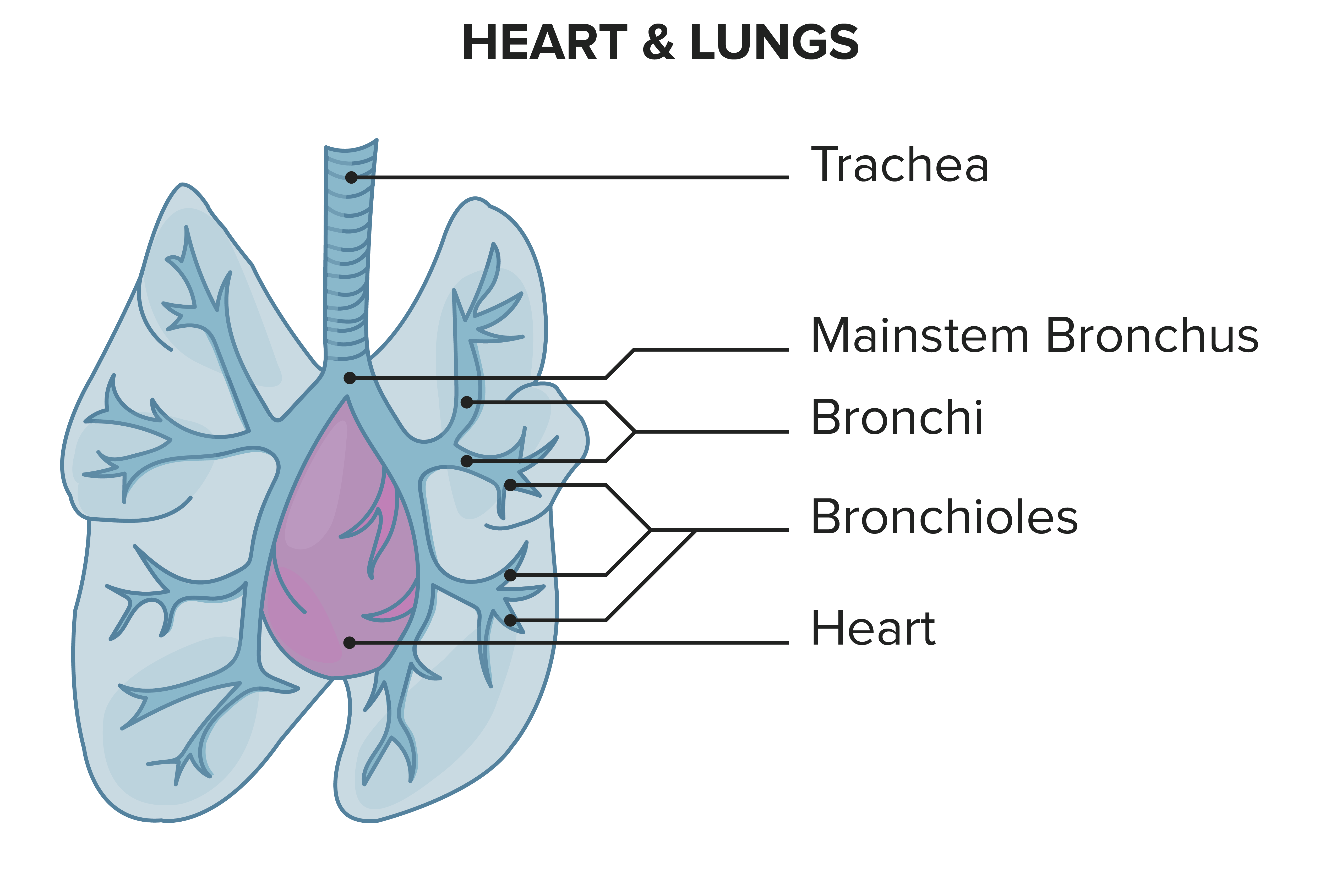Can dogs have asthma?
If you’ve ever heard a dog wheeze, you’ve probably chalked it up to dog asthma.
But wait: can dogs have asthma? Let’s find out.
Dog asthma: Fact or fiction?
We’ll cut to the chase: because they don’t have reactive airways like cats, horses, and humans, dogs don’t get asthma. However, they can develop conditions that mimic asthma—chronic bronchitis and allergic pneumonitis, for example.
Before we address “dog asthma,” we’re going to back up a step and explain what, exactly, asthma is.
What is asthma, anyways?
Asthma is a condition that involves recurring episodes of airway inflammation and narrowing. Spasms of the bronchi (the large air passages that connect the windpipe and the lungs) cause difficulty breathing. The lungs become inflamed and are extra reactive to stress and other irritants.
Asthmatic episodes are usually caused by an allergic reaction to things like pet dander, pollution, or mould; however, they may also flare up after exercise or based on genetics.
While the symptoms of asthma may come and go, if those symptoms aren’t well controlled they can lead to permanent lung damage and even become life threatening.
Although dog asthma is not a real condition, it is very real for our feline friends. Keep an eye and an ear on your cats.
“Dog asthma” is actually bronchitis
A short anatomy lesson to kick things off.
Dogs’ main windpipe is called the trachea. This trachea splits into two mainstem bronchi, one for each lung. These then branch into smaller bronchi, even smaller bronchioles, and end with itty bitty alveolis. Alveolis are chambers where the oxygen inhaled from the air is absorbed into your dog’s body.

What looks like dog asthma is actually bronchitis, a condition that can either be acute (sudden, and generally lasting only a short period of time) or chronic (ongoing, usually for longer than 2 months).
Chronic bronchitis is a continuous inflammatory condition that affects the lining of the trachea and bronchi. It’s the most common cause of a chronic cough in dogs, but it’s also a diagnosis of exclusion. What does that mean? It means veterinarians must first rule out other possible causes.
EXPERT TIP: In medical terms, the ‘itis’ in bronchitis essentially means inflammation. Bronchitis is the inflammation of the bronchi, pancreatitis is inflammation of the pancrea, dermatitis is inflammation of the dermis (skin), and so on. You get the idea!
Common conditions that cause dogs to have a chronic cough include:
- Obesity
- Dog allergies
- Tracheal collapse
- Pneumonia
- Heart failure
- Parasitic infection
- Neoplasia
From this list, allergies are among the most common culprits. Let’s chat a bit more about allergic bronchitis.
What is allergic bronchitis?
Allergic bronchitis may be triggered by exposure to allergens such as pollen and grass, or by other environmental irritations like smoke or pollutants.
This is a long-term, progressive condition that can lead to permanent lung damage if not properly managed. While not infectious, the fact it can compromise the health of your dog’s lungs and lead to secondary issues like bacterial pneumonia is reason enough to treat this with the urgency and severity it deserves.
Symptoms of chronic bronchitis include:
- Coughing fits with a wet, hacking cough (i.e., bringing up mucus)
- Coughing is worse at night, after rest, at the start of exercise, and when excited
- Lethargy, particularly if there is excessive mucus obstructing the airway
- Blue gum colour, indicating a low oxygen level in the blood (seen in severe cases)
- Loss of consciousness
What’s causing my dog to cough?
Anytime a part of your dog’s airways become inflamed, they swell up and go into protection mode by releasing mucus. This narrowing means less air reaches the lungs. Coughing is a reflect to clear the airway of mucus and secretions, but it also contributes to the irritation, result in a pesky and sometimes painful cough-irritation cycle.
The reduced airflow decreases the oxygen available to tissues and causes the symptoms of wheezing or abnormal lung sounds, shortness of breath, and chest tightness. Sometimes the coughing may be mistaken for vomiting and it may be accompanied by gagging and retching.
If my dog is having a “dog asthma” episode, when should I call a vet?
If your dog is coughing excessively and it doesn’t subside after a few days, it’s worth a visit to your local vet clinic. Even if a cough is intermittent, it should be investigated to keep your pup’s lungs as happy and healthy as can be. We want you both to enjoy years of running around together without having to stop for shortness of breath!
In the event of a sudden coughing attack, follow these three tips:
- Stay calm. Your dog may become more stressed if they sense you are stressed.
- Move your dog to a cool, well-ventilated area so it is easier for them to catch their breath.
- Assess for emergency. Look for signs like blue or purpose gums or tongue, and severe shortness of breath (using abdominal muscles to breathe). If yes, seek help as soon as possible.
Which dogs get these asthma-like conditions?
We hate being the bearers of bad news, but any breed of dog can develop bronchitis.
Having said that, chronic bronchitis presents more often in small and toy dog breeds. Also at increased risk at middle-aged and senior dogs (over the age of 6), or after being subjected to an environmental stressor or sudden change in weather.
How does a veterinarian diagnose bronchitis?
Animal health professionals receive in-depth training to be able to diagnose and treat bronchitis. To do this, though, they’ll need your help: in addition to a thorough physical exam and possible testing, your veterinarian will ask you for a history that includes any symptoms and clinical signs you’ve noticed. Keep a record of “dog asthma” episodes to share at your vet visit.
Some tests your veterinarian may recommend include:
- Blood work to rule out other medical contributors
- Chest x-rays to visualize lung patterns
- Advanced imaging like bronchoscopy (a camera down your dog’s airways) or CT scan
- Airway sampling using swabs, washes cultures, or biopsies to look for potential culprits like parasites or bacteria
How to help your dog manage bronchitis
Managing bronchitis is a team effort by you and your veterinarian. Here’s how to keep your dog’s airways (and communication) clear.
Things you can do
- Help your dog maintain a healthy weight
- Swap your dog’s collar for a harness to reduce pressure to the neck and trachea
- Opt for a more moderate (but still consistent) exercise routine
- Try to reduce barking, which can trigger irritation
- Practice good oral hygiene to reduce icky and irritating bacteria
- If congested, practice coupage (thumping the chest with cupped hands to help break up airway secretions)
- Reduce or eliminate as many environmental triggers as possible
- Don’t smoke around your dog
- Avoid perfumes and scented aerosol products
- Keep your dog in well-ventilated areas set to comfortable temperatures
- Invest in humidifiers, air purifiers, and diffusers as needed
- If there’s a cat in the house, choose an unscented, low-dust litter
Things your veterinarian might recommend
Different dogs respond to different treatments. Thankfully, there are several options to choose from. These can organized into four categories:
- Corticosteroids
Corticosteroids like prednisone are either oral or inhaled steroids that help decrease inflammation and secretions. Drying up mucus can put an end to the cough-irritation cycle.
Most veterinarians prefer inhaled steroids to oral ones as they directly target affected tissue(s), have fewer side effects, and require a smaller amount.
EXPERT TIP: Never administer medication (especially human or over-the-counter meds) without first consulting your veterinarian. Even if it’s a medication you’ve used in the past, there may be differences in dosing that need to be taken into consideration.
2. Cough suppressants
Suppressing your dog’s cough offers relief and may allow them to relax and rest. (Sleep is medicine, too.)
3. Airway dilators
Airway dilators can help calm an angry airway. Relaxing the airway allows air to more easily pass through. Often this category of medications is used in combination with corticosteroids.
4. Other
This one’s a bit of a mixed bag, and includes things like antihistamines (when allergies are suspected), diuretics (to remove excess fluid), mucylytics (to help break down mucus in the airway), antibiotics (when there’s a confirmed bacterial infection), and parasite therapy.
Like what you read? Share with a friend and subscribe to Waggle (e)Mail. We’ll let you know when a new resource drops, and give you first dibs on exclusive information, offers, and ways to take the very best care of your very best friend.

